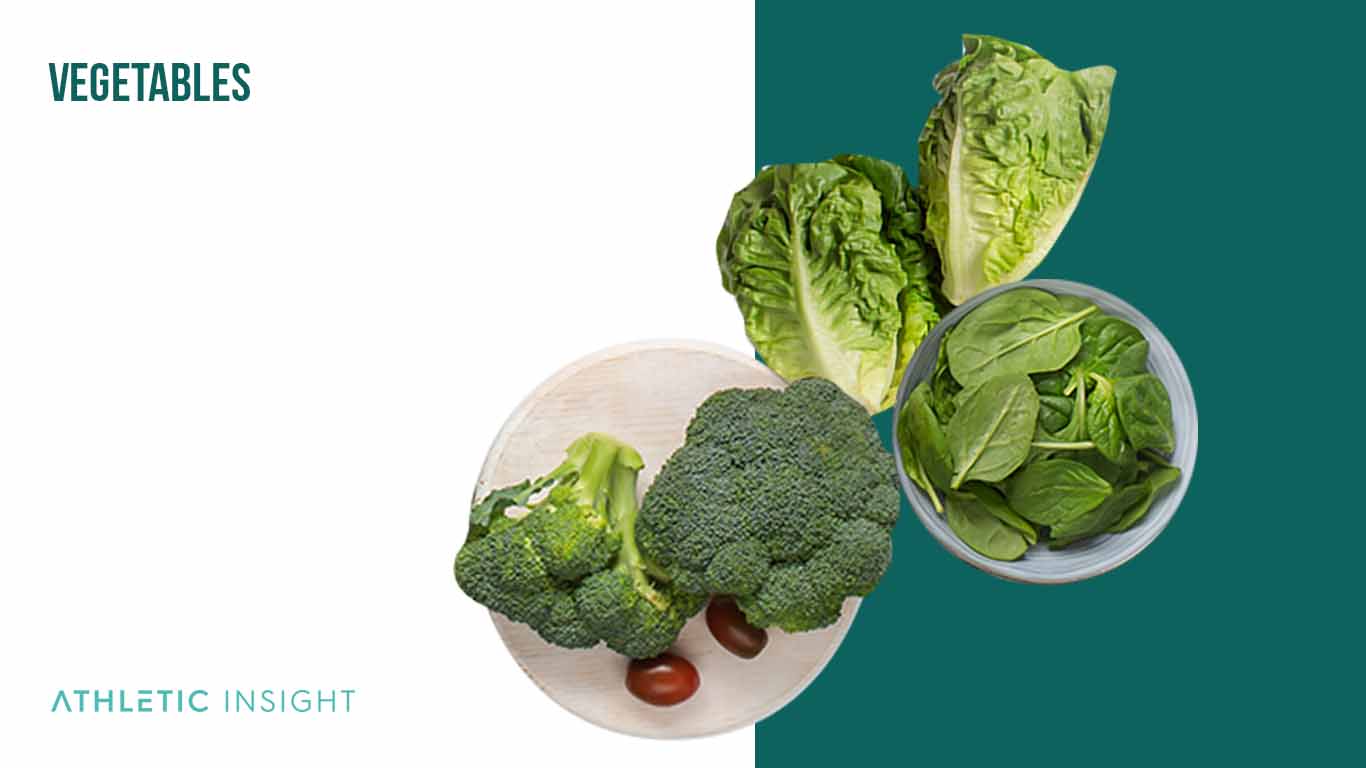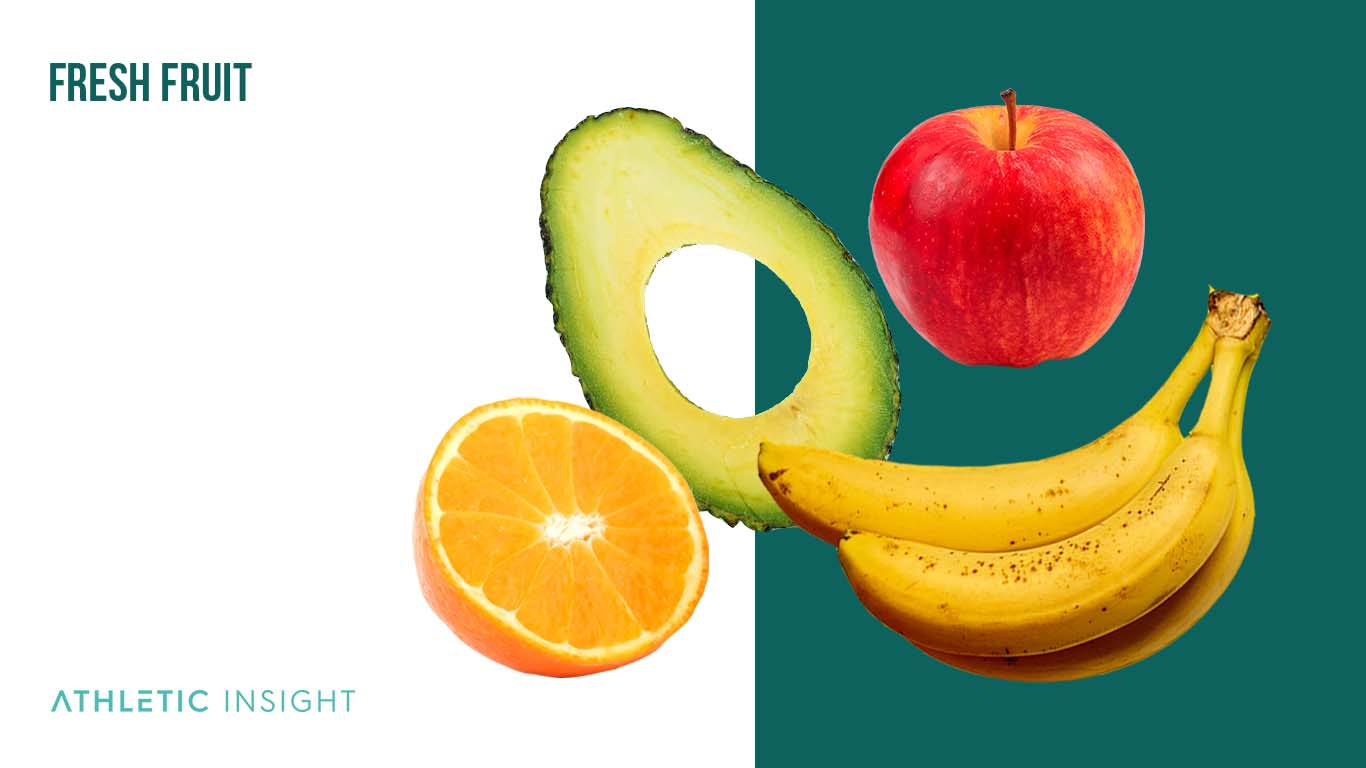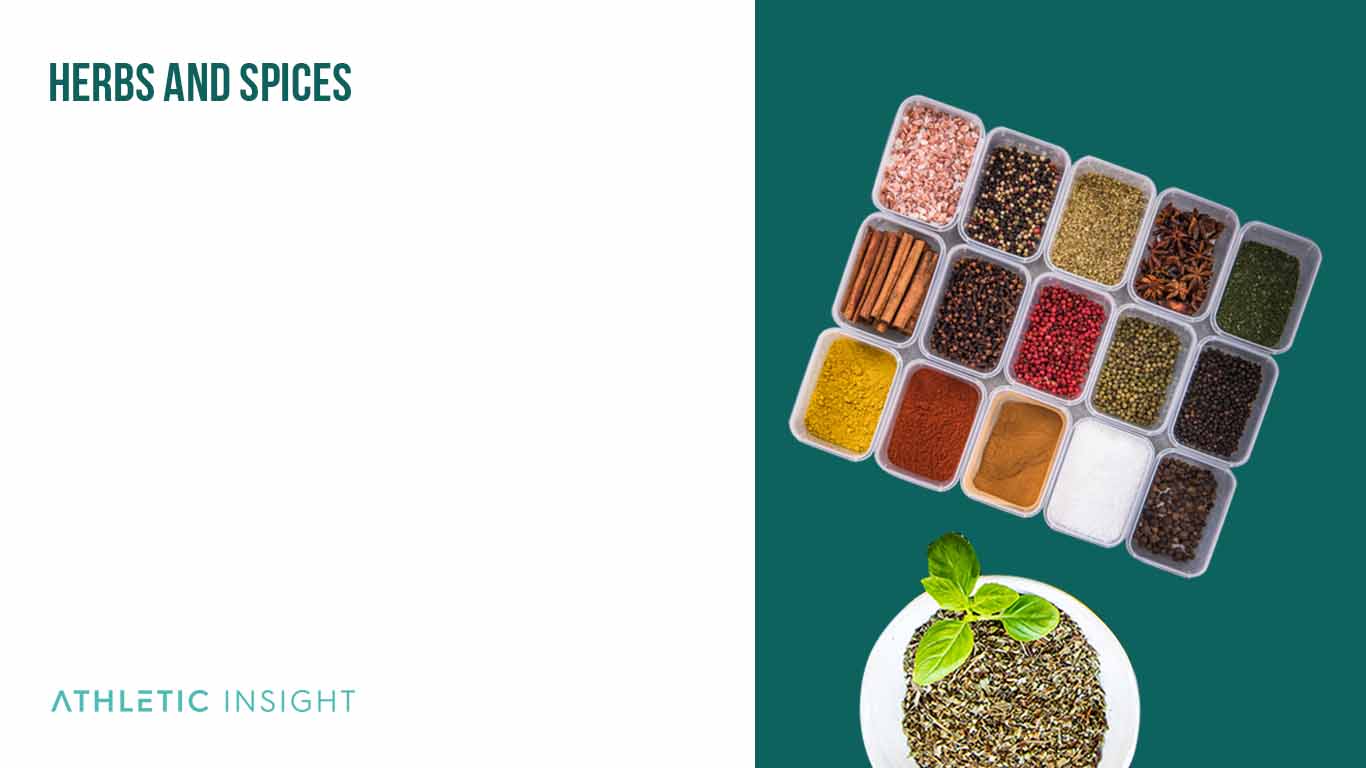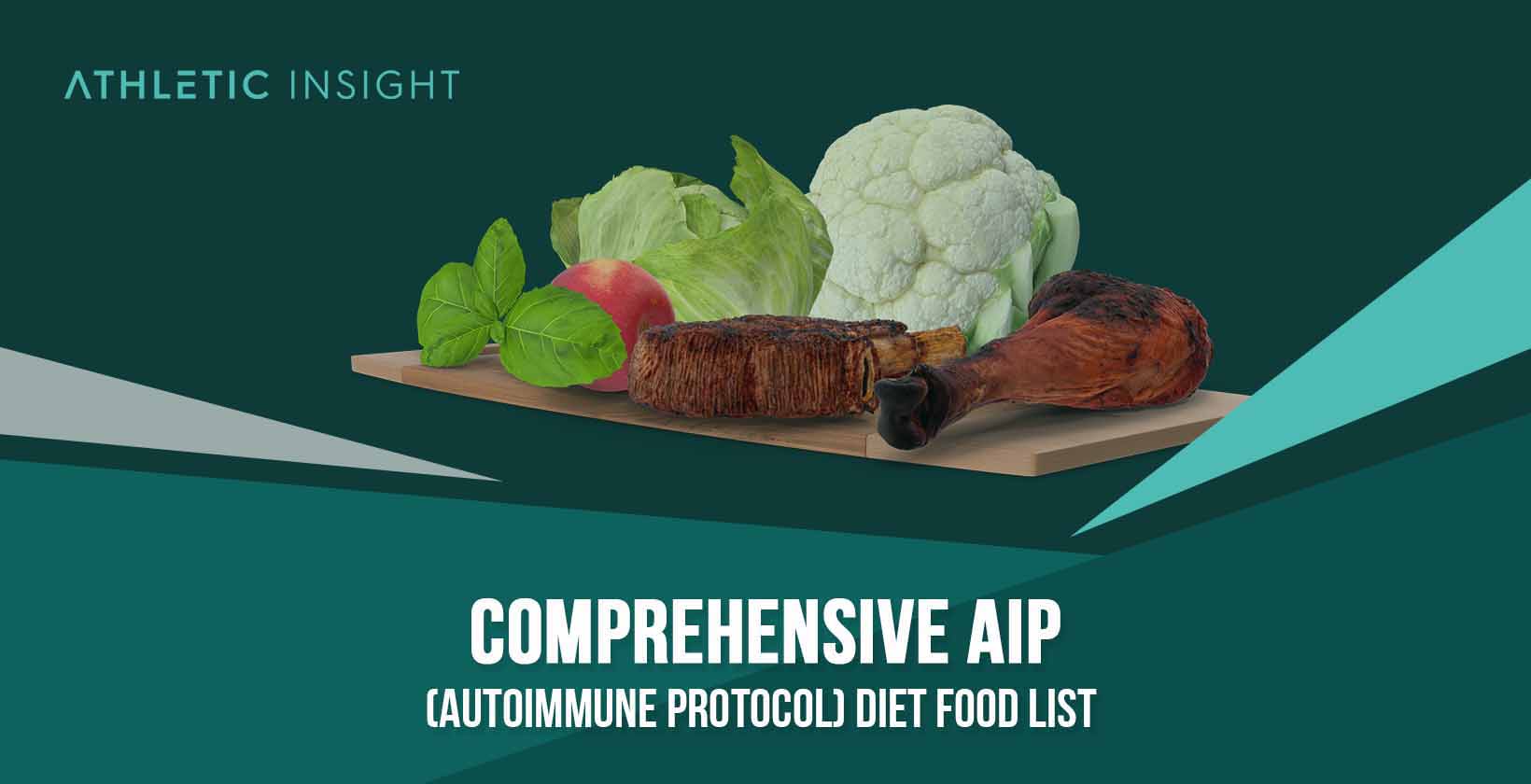The AIP (Autoimmune Protocol) diet is a nutrition program where you eliminate irritating or harmful foods to solve autoimmune and digestive problems. Then, you slowly introduce foods back into your diet to see how they affect your body.
What foods you can and cannot eat can get confusing, so this is a convenient and comprehensive list of AIP-approved foods. This is the complete AIP diet food list, including what foods to avoid on the AIP diet.
1. Vegetables
Vegetables are one of the main sources of nutrition for people on an AIP diet. However, it’s best to avoid certain vegetables, such as nightshades like potatoes, peppers, eggplant, and tomatoes.

Most vegetables are on the AIP protocol food list, but avoiding starchy vegetables is crucial. Below are some of the best nutrient-dense vegetables to incorporate into your AIP diet.
- Celery
- Brussel sprouts
- Leeks
- Cucumbers
- Broccoli
- Onions
- Scallions
- Pumpkin
- Mushrooms
- Squash
- Avocado
- Cabbage
- Beets
- Arugula
The key is to try and avoid starchy veggies and vegetables containing capsaicin.
Vegetables will not contribute much to your healthy fat intake but can help you get to your daily protein intake goals, especially vegetables like spinach and peas which are loaded with protein. Ideally, you should have a serving of vegetables with every meal.
2. Fresh Fruit
Almost all fruits are on the AIP-approved food list. A handful of fruits are nightshades and should be avoided, including gooseberries, huckleberries, and goji berries.

Fruit is high in fiber, antioxidants, and natural sugars, making it the perfect sweet treat for people following an AIP diet. Below are some of the best fruits to eat on an AIP diet.
- Lemon
- Guava
- Cantaloupe
- Cherries
- Mangoes
- Cranberries
- Watermelon
- Oranges
- Pears
- Coconut
- Bananas
- Kiwi
- Figs
- Blueberries
- Pineapple
- Grapes
Fruits don’t offer much fat or protein but are still beneficial and you can have two to five servings daily, but make sure you do not consume too much sugar.
3. Tubers
Tubers are rounded parts of certain vegetables, like potatoes and yams. While you are avoiding starchy vegetables in your diet, flours made from tubers can be great alternatives to grain-based flour. You can use the tubers below instead of wheat flour and cornstarch.
- Cassava flour
- Arrowroot
- Carob powder
- Coconut flour
- Tigernuts
- Jicama
- Cream of tartar
- Plantain flour
Tubers and tuber-based products can be a saving grace for AIP-compliant people who love to cook and bake but find themselves unable to use pantry staples like flour.
4. Minimally Processed Meat
Meat is tough for people on the AIP diet. All meat is safe for people following the AIP diet, the problem is how processed the protein is. AIP-friendly foods need to be unprocessed or minimally processed.
The average adult needs 60 grams of protein per day, and the easiest way to meet this requirement is by eating meat. When shopping, look for organic, grass-fed products, as these will be less processed.
Avoid deli meat and anything with preservatives or nitrates. The following types of meat, when unprocessed, are good for an AIP diet.
- Anchovies
- Salmon
- Tilapia
- Tuna
- Clams
- Mackerel
- Shrimp
- Pork
- Duck
- Turkey
- Cod
- Scallops
- Sardines
- Lamb
- Bison
- Grass-fed beef
- Chicken and other poultry
- Crab
- Oysters
- Elk
- Organ meats
- Lobster
- Goat
- Mussels
Even some beef jerky products are AIP-friendly! And items like lobsters, oysters, and mussels are particularly perfect because they are barely manipulated before making it to your mouth.
5. Fermented, Probiotic-Rich Foods
Many AIP fermented foods are super high in probiotics, which are excellent for gut health. Since the AIP diet is ideal for people with digestive and gut issues, incorporating fermented food can significantly reduce these problems.
These AIP foods you can eat can mitigate Leaky Gut Syndrome and similar conditions. Below are the foods you can consume for gut health.
- Water kefir
- Coconut milk kefir
- Coconut yogurt
- Kombucha
- Pickled veggies
- Sauerkraut
- Kimchi
- Capers
- Homemade pickles
Some of these products contain small amounts of healthy fats and protein that can help you reach your daily fat and protein intake. But alone, none of these items are enough to help you reach your daily requirements. You can have as many as five servings of any of the above foods daily.
6. Minimally Processed Vegetable Oils
Don’t worry, you don’t have to cut out oil from your diet completely. However, you do need to consume minimally-processed vegetable oils. Avoid nut oils, like peanut oil or sesame oil. Below are the best vegetable-derived oils to use.
- Olive oil
- Coconut oil
- Coconut butter
- Avocado oil
- Palm oil
The AIP diet does not allow seed oils or highly-processed fats. The oils above are good for the heart and can give you energy and support cell functions. But too much oil is bad for your body, so you shouldn’t use more than one to two tablespoons of oil a day.
Adding an oil-based dressing to a salad or cooking with oil can increase your intake of healthy fats.
7. Herbs and Spices
Luckily, many delicious herbs and spices are on the approved AIP diet food list! So your meals don’t have to be bland. Each of the different spices and herbs listed below has various benefits, but ginger, garlic, and turmeric are known for their impressive digestive support.

None of these ingredients offer enough healthy fat or protein to impact your daily intake. But you can use as much as you want! Below are some of the best AIP-approved herbs and spices.
- Turmeric
- Sage
- Dill
- Ginger
- Chives
- Rosemary
- Basil
- Bay leaf
- Cardamom
- Peppermint
- Cinnamon
- Garlic
- Thyme
- Saffron
- Parsley
- Cilantro
- Mint
If you’re just beginning your AIP diet journey, adding more of these herbs and spices to your meals can help remedy gut problems faster. Some spices come from nightshades and must be avoided, including nutmeg, cayenne, and paprika.
It’s generally advised to avoid anything spicy that contains capsaicin. If you want to add some heat to your dishes, wasabi and horseradish are AIP-compliant options. Also, seed-based spices are a no-go. So you cannot eat star anise, coriander, celery seed, or cumin.
8. Vinegars
Even though vinegar is not liked by most of the population, it is one of the best AIP-approved foods because it adds a lot of flavor and can help your gut health.
Vinegar may protect cells from oxidative stress and damage while supporting digestion and immunity. Most vinegar contains zero fat and protein, so it won’t help you reach those daily requirements. Below are some of the AIP-approved types of vinegar.
- Ume plum vinegar
- Champagne vinegar
- White wine vinegar
- Red wine vinegar
- Apple cider vinegar
These types of vinegar are an easy way to add flavor to meals without upsetting your stomach and digestive system. Try to buy organic versions, as these will be less processed and free of additives. Avoid any distilled or rice-based kinds of vinegar.
9. Natural Sweeteners
Anyone familiar with the AIP diet knows that processed products are the enemy. One of the worst culprits is sugar. Most sugar products are heavily processed and refined, which can upset immunity and digestive health. Use the following few natural sweeteners instead of sugar.
- Pure honey
- Pure maple syrup
- Cate sugar
- Maple sugar
- Coconut sugar
- Blackstrap molasses
This category is tough, as many of the items above can come processed. When shopping, look for organic products and pure products. Artificial honey and maple syrup are a nightmare for the digestive system, so everything you consume must be as unprocessed as possible.
None of these ingredients have substantial levels of fat or protein, so they won’t impact your daily intake. However, they are high in glucose (sugar), so you need to consume them in moderation to avoid inflammation, weight gain, and associated conditions like diabetes.
10. Certain Teas
One of the hardest parts of following an AIP diet for many people is the lack of coffee and caffeine. Caffeine is not AIP-approved, but you can have most kinds of tea. All herbal and lack teas are safe but in moderation.
The trace amounts of caffeine in herbal and black tea can upset your immune system if you consume too much. You also have to avoid additives that are not conducive to an AIP diet, like milk, cream, processed sugar, and processed honey. The teas below are AIP-approved.
- Herbal tea
- Green tea
- Black tea
- Ginger tea
- Mint tea
- Chamomile tea
When in doubt, organic and caffeine-free teas are the safest option. Remember, decaffeinated is not the same as caffeine-free. Decaffeinated products can still contain caffeine, while caffeine-free products never had any caffeine in the first place.
11. Bone Broth
Bone broth is one of the best AIP-compliant foods to consume at the beginning of your diet. Loading your body with fluids and protein can help your digestive system balance itself so you can feel better and minimize symptoms.
Bone broth from many animals is rich in minerals, vitamins, amino acids, and essential fatty acids. You can drink bone broth or use it in AIP food recipes and soups.
Two cups of bone broth constitute a third of your daily protein intake and about a fifth of your daily fat intake. Below are the most consumed types of bone broth.
- Beef broth
- Turkey broth
- Chicken broth
It is uncommon, but a steaming cup of bone broth in the morning, afternoon, or evening can do wonders for your digestive problems and help you reach your daily fat and protein intake requirements. You can buy organic bone broth or make your own at home.
What Can’t You Eat on AIP (Autoimmune Protocol) Diet?
Now that you know what you can eat, this section will explain what you cannot eat and why. Below are the 10 AIP foods to avoid.
1. Grains
Grains are one of the worst kinds of foods to eat when struggling with autoimmunity and intestinal issues. The gluten in grains can cause Leaky Gut Syndrome and create digestive discomfort.
Grains cause inflammation and irritation in some people’s guts, damaging the intestinal lining. This happens because the food converts to glucose too quickly, drastically affecting blood sugar levels and spurring chronic digestive issues.
When starting the AIP diet, grains should be the first thing to go. Avoid all grains, such as the ones below.
- Barley
- Wheat
- Bulger
- Corn
- Oat
- Quina
- Rice
- Rye
2. Legumes
Many legumes contain antinutrients, which interfere with digestive health. When you consume too many legumes, your digestive tract struggles to absorb nutrients from other foods.
The lectin compound found in most beans and legumes can also break down gut barrier cells, leading to Leaky Gut Syndrome. Avoid the following legumes.
- Black beans
- Chickpeas
- Fava beans
- Lentils
- Lima beans
- Kidney beans
- soybeans
3. Nightshade Vegetables
Nightshade vegetables have components that can lead to inflammation in the gut and also cause joint issues. They can be quite harsh on your digestive system and also worsen symptoms associated with many autoimmune disorders. Below are nightshade vegetables.
- Eggplant
- Spicy peppers
- Bell peppers
- Potatoes
- Tomatoes
- Goji berries
- Ground cherries
- Tomatillos
4. Eggs
No eggs are AIP-compliant because they are one of the most common allergens. The yolks are better than the egg whites, but it’s best to avoid all eggs when first beginning the diet. Eggs are often one of the first foods people re-introduce because, while they can cause gut irritation, they are a tolerable protein compared to nuts, legumes, and processed meat.
5. Dairy
With more and more people being diagnosed with lactose intolerance, it’s no surprise that dairy is not good for your stomach or immunity. Dairy products can weaken your gut lining and cause allergies and inflammation.
High-quality dairy products can be okay, but avoid them until you get your digestive problems under control. Avoiding dairy for an extended period allows your gut lining to heal. People following an AIP diet cannot have the dairy products below.
- Butter
- Cheese
- Cream
- Milk
- Ghee
- Yogurt
- Ice cream
6. Nuts and Seeds
Nuts and seeds are not AIP-compliant because they can cause gut inflammation. These foods can bind to minerals in your gut, preventing them from being properly absorbed. Nuts and seeds have the potential to be reintroduced, but are cut out when you start the diet. Avoid the following nuts and seeds.
- Almond
- Canola
- Cashew
- Coffee
- Cocoa
- Hazelnut
- Hemp
- Flax
- Pistachio
- Pine nuts
- Sesame
- Sunflower
- Walnut
- Pecan
- Black pepper
- Poppy seeds
- Cumin
- Nutmeg
- Mustard
7. Certain Beverages
The number one beverage to avoid is alcohol, as it can harm your gut and lower your immunity. But also avoid caffeinated beverages like coffee, energy drinks, and soda. Most drinks contain high amounts of processed or refined sugar, so it’s best to stick to water while on this diet.
8. Processed Vegetable Oils
Processed vegetable oils contain large amounts of harmful chemicals. Some of these bad chemicals include hexane and pesticides, which can wreak havoc on your gut lining and digestive system, while also worsening the symptoms of autoimmune disorders.
9. Refined or Processed Sugars
Refined and processed sugars are harmful to the human body, even if you don’t have digestive or autoimmune troubles. Heavily processed or refined sugar causes gut inflammation and damages the protective mucus layer. Consuming these sugars makes it difficult to maintain proper pH levels and good bacteria.
10. Food Additives and Artificial Sweeteners
All food additives and artificial sweeteners can prevent healing in your gut and cause more damage. Avoid gums, food dyes, and processed sugar to give your gut time to heal itself. Some of the worst additives and artificial ingredients are listed below.
- Aspartame
- Acesulfame potassium
- Saccharin (SweetNLow)
- Advantame
- High-fructose corn syrup
- Sodium benzoate
- Food coloring
- Sodium nitrate
- Monosodium glutamate
How To Create an AIP (Autoimmune Protocol) Diet Plan
When following an AIP diet plan and using the AIP food list, adhere to the following intake guidelines.
- 20-35% calories from healthy fats
- 20-35% calories from protein
- 30-60% calories from carbs
Eat three meals a day and try to maintain a daily calorie intake between 1,900 and 2,1000 calories. So, do not eat less on an AIP diet, just differently. Doctors recommend the AIP (Autoimmune Protocol) Diet for people with autoimmune disorders or digestive problems. But if you do not have these conditions, it is not recommended.
To get started, you can find plenty of AIP-compliant food plans online. Some are full-month plans, while others give you daily guides. And you can incorporate snacks like apple chips, grain-free cookies, coconut chips, dried fruit, and plantain crackers.
You can find plenty of AIP-friendly recipes online, but you can also buy some of the phenomenal autoimmune protocol diet recipe books! This diet can be intimidating and feel very restrictive, but once you find some snacks and meals you enjoy, it becomes easier.
What Are the Other Similar Food Lists for AIP Diet?
Paleo food lists are similar to AIP food lists. However, the AIP diet is more restricted. Many people start by adhering to paleo food lists at the beginning of their diet before eliminating the more difficult foods.
Another similar diet with comparable food lists is the Whole30 diet. Both diets are short-term elimination plans with a reintroduction phase. Most Whole30 lists are AIP-compliant but can feature soy products and legumes.
Where to Buy AIP Diet List Foods?
You can buy AIP cheat sheets to hang on your fridge or keep in your wallet. Most AIP comfort food cookbooks also feature an extensive list of approved foods. These products are convenient and helpful, but also unnecessary.
You can find comprehensive AIP-compliant food lists, like this article, for free online! But pocket lists can make shopping easier, and cookbooks can make meal planning easier.
Are There Any AIP Paleo Food Delivery?
Yes, Blue Apron, Factor, and Hello Fresh are some of the AIP Paleo food delivery subscription services that cater to AIP and paleo diets. Below are some of the best food delivery services that have AIP/paleo plans.
- Blue Apron
- Factor
- Hello Fresh
- Home Chef
- Eat Clean
- bistroMD
- Martha Stewart and Marley Spoon
- Paleo On the Go
- Green Chef
While following an AIP diet can be a challenge, these AIP food delivery services can make it easier. Cutting out food groups and shopping with care is tough, but it’s worth the extra effort to care for your body and solve autoimmune and digestive issues that are plaguing you.



